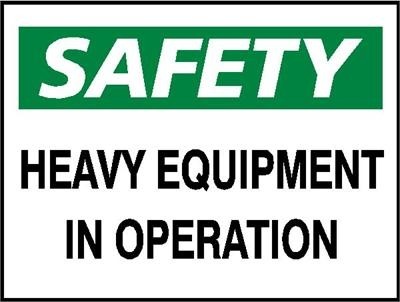Heavy Equipment Safety Tips

When working in the construction field, safety should always be a top priority. This is especially true for sites where large machinery is used. Proper use of such machinery could not only keep the construction site open, but also save your life and lives of everyone in your crew. These tips should help you and your crew remain safe while operating heavy equipment.
Bulldozer Safety
As one of the primary large construction vehicles used on construction sites, bulldozer safety is of the utmost importance. First, always wear a seat belt when operating a bulldozer. Though these machines are generally slow, it's usually a bumpy ride and the last thing you want is to be thrown from the bulldozer to the ground below. Also, nobody without proper training or qualifications should be allowed to operate a bulldozer. When using a bulldozer close to the public or where traffic is present, it's also important to have traffic control to protect both the work crew and nearby pedestrians. Finally, be very cautious when driving a bulldozer close to uneven ground, dips or trenches to remain in control of the vehicle and prevent a serious accident.
Personal Equipment
Many heavy machines are made to be operated with personal protective equipment. For example, you shouldn't use a jackhammer without protective eye wear. When dealing with heavy tools and machinery, it's generally a good idea to wear a hard hat to protect your head. You may also want to wear gloves, but be aware of how they can affect your sense of feel and control over the machinery. If gloves make the machine more difficult to operate, don't use them. The foreman or person in charge at the construction site should be able to tell you what protective gear to wear for what heavy machinery if you're in doubt.
Communication
The easiest way to prevent accidents is through good communication. When using large or heavy tools and machinery, it may be difficult for those around you to know what you're going to do, which is why communication is crucial. ToolboxTopics.com suggests using a set of hand signals when the noise level is too high for clear vocal communication. While operating heavy machinery, always be aware of where every member of the ground crew is in relation to what you're doing. All heavy vehicles should have a backup alarm that sounds whenever the vehicle is in reverse. Also, walkie-talkies can make great communication tools when loud machinery is in use, as hand signals require a direct line of sight.
Bulldozer Safety
As one of the primary large construction vehicles used on construction sites, bulldozer safety is of the utmost importance. First, always wear a seat belt when operating a bulldozer. Though these machines are generally slow, it's usually a bumpy ride and the last thing you want is to be thrown from the bulldozer to the ground below. Also, nobody without proper training or qualifications should be allowed to operate a bulldozer. When using a bulldozer close to the public or where traffic is present, it's also important to have traffic control to protect both the work crew and nearby pedestrians. Finally, be very cautious when driving a bulldozer close to uneven ground, dips or trenches to remain in control of the vehicle and prevent a serious accident.
Personal Equipment
Many heavy machines are made to be operated with personal protective equipment. For example, you shouldn't use a jackhammer without protective eye wear. When dealing with heavy tools and machinery, it's generally a good idea to wear a hard hat to protect your head. You may also want to wear gloves, but be aware of how they can affect your sense of feel and control over the machinery. If gloves make the machine more difficult to operate, don't use them. The foreman or person in charge at the construction site should be able to tell you what protective gear to wear for what heavy machinery if you're in doubt.
Communication
The easiest way to prevent accidents is through good communication. When using large or heavy tools and machinery, it may be difficult for those around you to know what you're going to do, which is why communication is crucial. ToolboxTopics.com suggests using a set of hand signals when the noise level is too high for clear vocal communication. While operating heavy machinery, always be aware of where every member of the ground crew is in relation to what you're doing. All heavy vehicles should have a backup alarm that sounds whenever the vehicle is in reverse. Also, walkie-talkies can make great communication tools when loud machinery is in use, as hand signals require a direct line of sight.
- x626c444b9e0277f3ffbe65465f0a37171.jpg
Videos
References
http://www.ehow.com/list_6699259_heavy-equipment-safety-tips.html
Video:
https://www.youtube.com/watch?v=w2vSPpR4ELU
Picture:
http://www.signsuperstore.com/images/products/detail/oshasignsafetyheavyequipmentinoperation.jpg